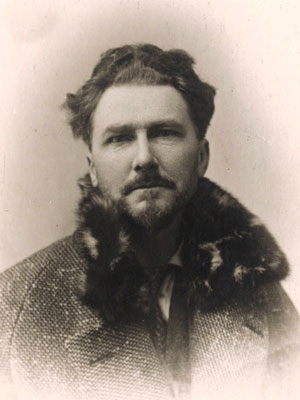Ezra Paund
Dalja uputstva
Hodite, pesme moje, hajde da iskažemo naše niske strasti
Hajde da pokažemo zavist prema čoveku sa sigurnim
poslom koji ne brine za budućnost.
Dokone ste, pesme moje,
Plašim se da ćete loše završiti.
Gluvarite po ulicama, dangubite po uglovima i autobuskim
stanicama,
Skoro da sasvim ništa ne radite.
Ne pokazujete čak ni naše unutrašnje plemenitosti,
Gadno ćete završiti.
A ja? Ja sam pukao na pola.
Toliko sam razgovarao sa vama, skoro da vas vidim pored sebe,
Bahate male bitange! Besramne! Razgolićene!
Ali vi, najnovije pesme medju mnogim,
Niste ostarile dovoljno da počinite mnogo zla.
Nabaviću vam zeleni kaput iz Kine
Protkan zmajevima.
Nabaviću vam skerletne svilene pantalone
Sa statue deteta Hrista Santa Marija Novele,
Da ne kažu posle da nam nedostaje ukusa,
Ili da porodica naša ne zna za otmenost.
. . .
Ezra Pound biography
Poet Ezra Pound was born on October 30, 1885, in Hailey, Idaho. He studied literature and languages in college and in 1908 left for Europe, where he published several successful books of poetry. Pound advanced a „modern“ movement in English and American literature. His pro-Fascist broadcasts in Italy during World War II led to his arrest and confinement until 1958.
One of the 20th century’s most influential voices in American and English literature, Ezra Pound was born in the small mining town of Hailey, Idaho, on October 30, 1885. The only child of Homer Loomis Pound, a Federal Land Office official, and his wife, Isabel, Ezra spent the bulk of his childhood just outside Philadelphia, where his father had moved the family after accepting a job with the U.S. Mint. His childhood seems to have been a happy one. He eventually attended Cheltenham Military Academy, staying there two years before leaving to finish his high school education at a local public school.
In 1901, Pound enrolled at the University of Pennsylvania, but left after two years and transferred to Hamilton College in Clinton, New York, where he earned a bachelor’s degree in philosophy. By this time, Pound knew full well that he wanted to be a poet. At the age of 15, he had told his parents as much. Though his chosen vocation certainly wasn’t something he had inherited directly from his more conventional mother and father, Homer and Isabel were supportive of their son’s choice.
In 1907, after finishing college, Pound accepted a teaching job at Indiana’s Wabash College. But the fit between the artistic, somewhat bohemian poet and the formal institution was less than perfect, and Pound soon left.
His next move proved to be more daring. In 1908, with just $80 in his pocket, he set sail for Europe, and landed in Venice brimming with confidence that he would soon make a name for himself in the world of poetry. With his own money, Pound paid for the publication of his first book of poems, „A Lume Spento.“
Despite the face that the work did not create the kind of fireworks he had hoped for, it did open some important doors for him. In late 1908, Pound traveled to London, where he befriended the influential writer and editor Ford Madox Ford, as well as William Butler Yeats. His friendship with Yeats in particular was a close one, and Pound eventually took a job as the writer’s secretary, and later served as best man at his wedding.
In 1909, Pound found the kind of success as a writer that he had wanted. Over the next year, he produced three books, „Personae,“ „Exultations“ and „The Spirit of Romance,“ the last one based on the lectures he had given in London. All three books were warmly received. Wrote one reviewer: Pound „is that rare thing among modern poets, a scholar.“
In addition, Pound wrote numerous reviews and critiques for a variety of publications, such as New Age, the Egoist, and Poetry. As his friend T.S. Eliot would later note, „During a crucial decade in the history of modern literature, approximately 1912–1922, Pound was the most influential and in some ways the best critic in England or America.“
In 1912, Pound helped create a movement that he and others called „Imagism,“ which signaled a new literary direction for the poet. At the core of Imagism, was a push
to set a more direct course with language, shedding the sentiment that had so wholly shaped Victorian and Romantic poetry.
Precision and economy were highly valued by Pound and the other proponents of the movement, which included F.S. Flint, William Carlos Williams, Amy Lowell, Richard Aldington, and Hilda Doolittle. With its focus on the „thing“ as the „thing,“ Imagism reflected the changes happening in other art forms, most notably painting and the Cubists.
Pound’s maxims included, „Do not retell in mediocre verse what has already been done in good prose“ and „Use no superfluous word, no adjective which does not reveal something.“ But Pound’s connection to Imagism was short-lived. After just a few years, he stepped aside, frustrated when he couldn’t secure total control of the movement from Lowell and the others.
Source: http://www.biography.com/
. . .

